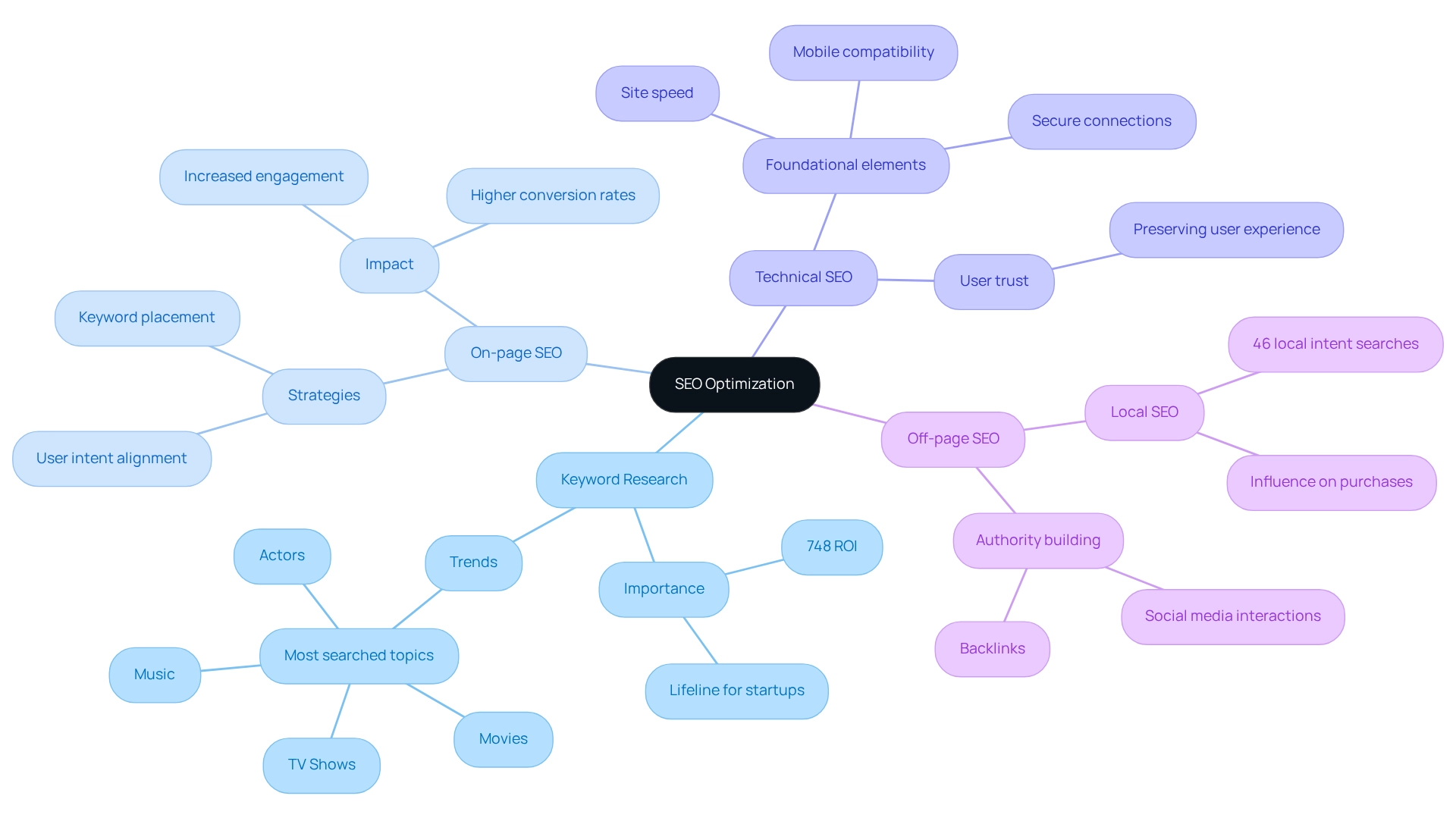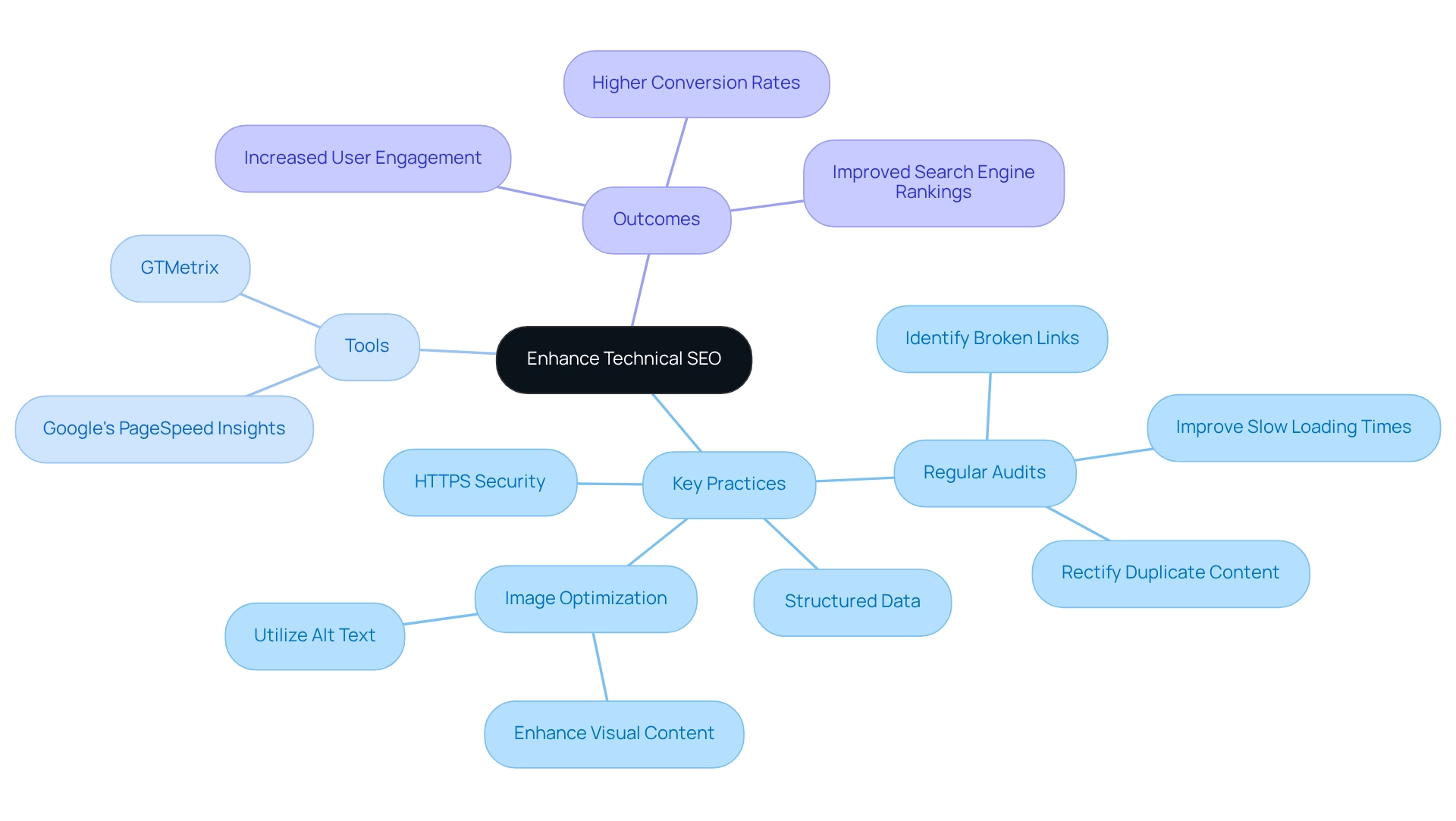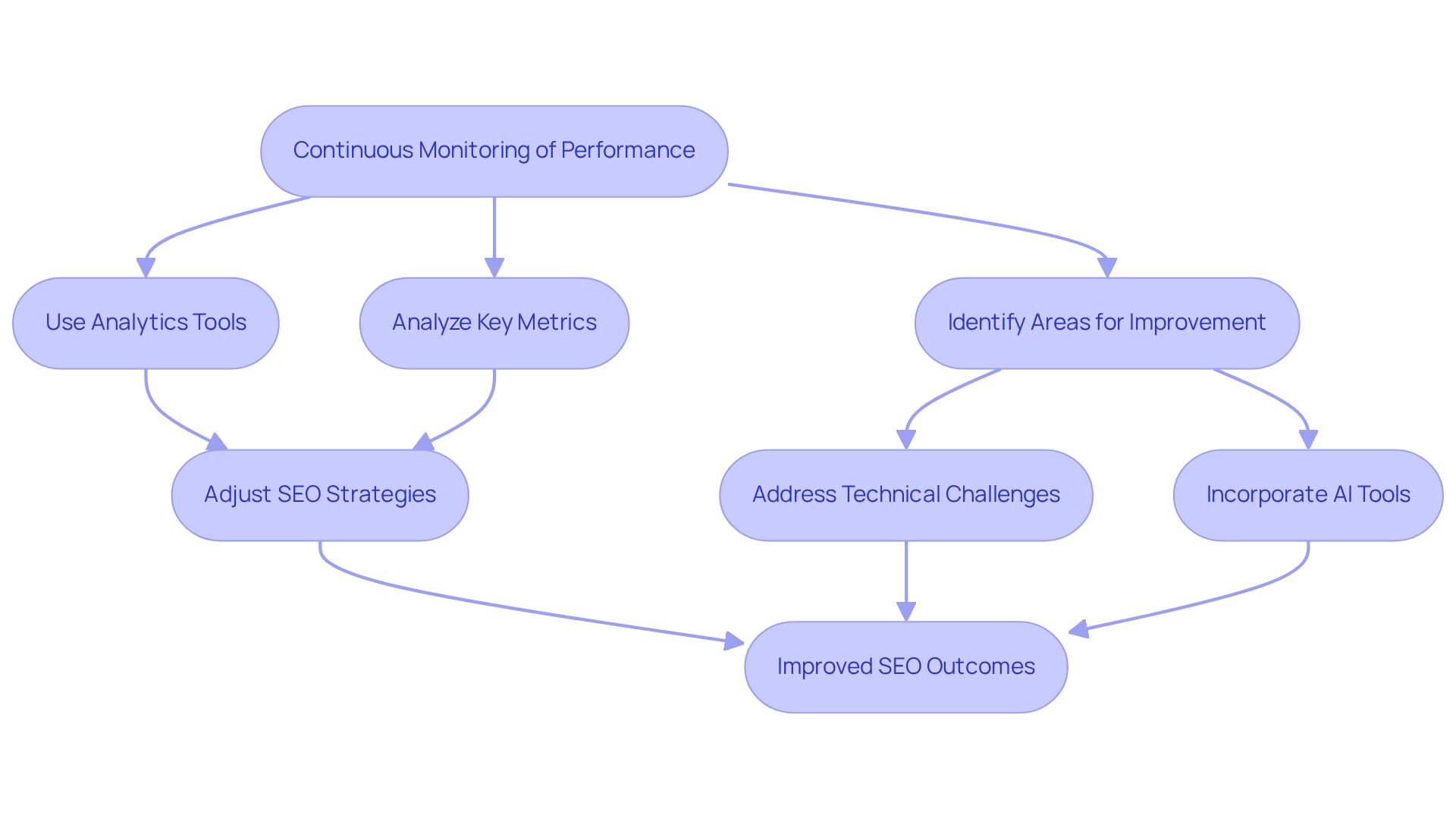Overview
In today's increasingly competitive digital landscape, many businesses face the daunting challenge of achieving website success. It can feel overwhelming, as the pressure to stand out grows. However, there are proven strategies that can help ease this burden and guide you toward success.
This article highlights five essential strategies for SEO optimization:
- Keyword research
- Technical SEO
- Content optimization
- Backlink development
- Continuous performance monitoring
These elements work together to enhance your website's visibility, improve user experience, and boost conversion rates. By focusing on these strategies, you can foster overall business growth and navigate the complexities of the digital world with confidence. Remember, you are not alone in this journey; with the right tools and support, success is within reach.
Introduction
In our ever-evolving digital landscape, many brands find themselves grappling with the challenge of enhancing their online visibility. It's a common struggle that can leave you feeling overwhelmed and uncertain about how to connect with your audience effectively. As e-commerce continues to grow and AI-driven search technologies emerge, the need to understand the nuances of Search Engine Optimization (SEO) becomes even more pressing. This is not just a technical requirement; it’s a vital part of your brand’s journey toward success.
Imagine the frustration of pouring resources into your online presence, only to feel invisible in a crowded marketplace. This pain point is shared by many, and it’s crucial to acknowledge that you’re not alone in this experience. The good news is that by embracing effective SEO strategies, you can turn this challenge into an opportunity.
In this article, we will explore the key components of successful SEO, from foundational practices like keyword research and on-page optimization to the essential role of technical SEO and content strategies. Together, we will delve into proven methods and the latest trends that can empower your brand to thrive in the competitive landscape of 2025 and beyond. Let’s embark on this journey together, ensuring that your voice is heard and your brand shines brightly in the digital world.
Understand SEO: Definition and Importance
Search Engine Optimization (SEO) presents a significant challenge for many companies striving for the to enhance visibility on search engines like Google. As we approach 2025, the stakes are higher than ever. Companies increasingly rely on to connect with consumers, making the [SEO optimization of their website](https://rno1.com/capabilities) not just beneficial, but essential. It’s not just about attracting organic traffic—often more valuable than paid traffic due to its —but also about creating a seamless user experience. This dual benefit helps potential customers discover and engage with your offerings, fostering meaningful connections.
Yet, recent trends reveal a pressing issue: pages ranking in the top 10 of Google search results have a 50% lower keyword density than those from two years ago. This shift underscores the need for a thoughtful, refined approach to the SEO optimization of the website. With e-commerce projected to account for 41% of by 2027, companies must enhance their online presence to meet the growing demand for digital shopping. It’s a daunting task, but one that can lead to significant rewards.
Expert insights remind us that . is not just a strategy; it’s a necessity for improving visibility. Companies that have embraced effective backlink methods often share stories of remarkable improvements in their rankings and overall online presence. With 55% of American households expected to have at least one smart speaker, the integration of AI in search processes is becoming increasingly relevant. In fact, 32% of US adults believe AI can provide a better experience when searching for local businesses. This evolution highlights the importance of adapting SEO strategies for the SEO optimization of websites to leverage these technological advancements.
In conclusion, understanding and applying is not merely an option for companies aiming to thrive in the competitive digital landscape of 2025; it’s a vital step towards success. By focusing on the SEO optimization of their website, businesses can enhance their visibility, improve user experience, and ultimately drive higher conversion rates. Together, we can in .
Explore Key Elements of SEO Optimization
In the ever-evolving landscape of digital marketing, many tech startup founders grapple with the complexities of the . This challenge can feel overwhelming, especially when considering the myriad components involved, such as:
At the heart of this struggle lies keyword research, which is not just a task but a lifeline. It identifies the specific terms and phrases that potential customers use when searching for products or services. As we approach 2025, with 90% of voice inquiries performed in English, the urgency for companies to adapt their strategies for the [SEO optimization of websites](https://rno1.com/work) becomes clear, as on-page SEO is another critical aspect that can significantly impact visibility. By enhancing individual pages through the strategic placement of relevant keywords in titles, headers, and content, startups can improve their rankings. With 7.3% of SERPs featuring , the competition is fierce. Yet, successful brands have demonstrated that aligning content with user intent can lead to increased engagement and conversion rates, fostering a sense of connection with their audience.
Technical SEO serves as the backbone of a website, addressing its foundational infrastructure. Ensuring site speed, mobile compatibility, and secure connections are essential for preserving user experience and maintaining engine rankings. These elements are not just technical requirements; they are vital for building trust with users, which is crucial for any startup.
Off-page SEO, on the other hand, focuses on enhancing a site's authority and reputation through backlinks and social media interactions. Local SEO is particularly significant, as research shows that 46% of monthly Google queries have , with many leading to purchases. This highlights the importance of the SEO optimization of websites for local search, which can attract relevant traffic and integrate seamlessly into a comprehensive SEO strategy. Industry specialists emphasize that can yield an impressive 748% , underscoring its importance for companies in 2025. Moreover, recognizing that movies, TV shows, actors, and music are among the most searched topics on Google can guide tech startups in crafting content that truly resonates with their audience. By embracing these strategies, startups can navigate the complexities of SEO with confidence and compassion, ultimately fostering a thriving online presence.

Implement Proven Strategies for Content Optimization
In today's digital landscape, brands often grapple with the challenge of creating content that truly connects with their audience. The pressure to produce can feel overwhelming. It's essential to remember that incorporating targeted keywords and crafting compelling meta titles and descriptions are just the beginning of . Structuring content for readability, using appropriate headings and bullet points, can make a significant difference in how your message is received.
Moreover, integrating multimedia elements like images and videos can dramatically enhance user engagement. Did you know that content featuring visuals can ? This statistic highlights just how vital it is to capture your audience's attention, especially when you consider that children spend an average of 66 minutes on YouTube daily. is not just a nice-to-have; it's a necessity in today’s fast-paced environment.
Regularly updating your content is another crucial step in . Search engines tend to favor sites that provide current information, and staying ahead of the curve can set you apart from competitors. In fact, , underscoring the importance of flexible content approaches.
It's also worth noting that around 27% of global Internet users employ ad blockers, which means traditional advertising techniques may not resonate with everyone. This shift calls for to engaging users who may not respond to conventional methods; through the SEO optimization of a website, brands can not only but also . This journey toward greater online visibility and success is one we can navigate together, ensuring that your with those you aim to reach.
Enhance Technical SEO for Improved Performance
Enhancing is truly essential for optimizing website performance, and it involves several key practices that can feel overwhelming. Many founders face the challenge of ensuring their site is fast and mobile-compatible, knowing that these elements significantly impact search engine rankings. As we look ahead to 2025, it’s heartening to see statistics suggesting that websites with quicker loading times are favored by online platforms, leading to better visibility and user interaction. It’s fascinating to note that GBP posts featuring emojis received twice the number of clicks and greater conversions compared to those without, underscoring the importance of that complement technical optimizations.
To navigate these challenges, brands should consider conducting regular audits to identify and rectify issues such as:
- Broken links
- Duplicate content
- Slow loading times
Utilizing tools like , as discussed in the case study "Using Tools for Speed Assessment," can provide valuable insights into site performance, enabling businesses to implement effective optimizations.
Implementing structured data is another best practice that can assist engines in better comprehending website content, enhancing visibility in results. Additionally, ensuring that your website is secure by using HTTPS not only builds user trust but also positively influences search engine rankings. As Mindy Weinstein points out, a frequently overlooked SEO opportunity pertains to images, highlighting the necessity for companies to enhance their visual content as part of their technical SEO approach. By concentrating on these technical aspects, companies can create a solid foundation for of their website, which ultimately results in enhanced performance and elevated rankings.
Successful examples abound of companies that have and mobile-friendliness, leading to increased user engagement and conversion rates. Highlighting these technical SEO best practices is essential for any business aiming for the to thrive in the competitive digital landscape, especially considering that in 2024, 86.7% of user searches on Google utilized the default search engine format. Remember, you’re not alone in this journey, and with the right support and strategies, you can achieve remarkable results.

Monitor and Adapt SEO Strategies for Long-Term Success
For many brands, the journey to sustained SEO success can feel overwhelming. Continuous monitoring of performance through tools like Google Analytics and Search Console is essential. By keeping an eye on , bounce rates, and conversion rates, businesses can gain vital insights into the effectiveness of their strategies and identify areas that need improvement. In 2025, the is more important than ever, providing a detailed look into user behavior and engagement. Staying informed about changes in engine algorithms and industry trends is crucial for timely strategy adjustments.
Consider the technical SEO challenges that many face—broken links and slow loading speeds, for example. Addressing these issues can significantly enhance the of website visibility in search engines and also improve user experience. A case study of companies that navigated these challenges successfully shows that proactive monitoring and adaptation can lead to of their website, which results in better visibility and user engagement. Regularly revisiting and refining the SEO optimization of the website based on performance data and market dynamics not only helps organizations maintain their competitive edge but also nurtures sustainable growth in their . As noted, and enhance highlights the power of strategic adaptation. Furthermore, with into their strategies, leveraging advanced analytics can further optimize SEO efforts. This ensures that brands remain agile and responsive in an ever-evolving digital landscape.
We invite you to reflect on your own experiences with SEO. Have you felt the pressure of keeping up with changes? Remember, you’re not alone in this journey. By prioritizing a nurturing approach to SEO, you can foster a stronger connection with your audience and enhance your brand's digital presence.

Conclusion
Understanding and implementing effective SEO strategies is not just an option; it's a necessity for brands striving to flourish in the competitive landscape of 2025 and beyond. Many brands face the challenge of standing out in an overcrowded digital space, and this article highlights the critical role of SEO in enhancing visibility, driving organic traffic, and improving user experience. Key components such as:
- Keyword research
- On-page optimization
- Technical SEO
- Off-page strategies
have been explored, showing how each element contributes to a brand's overall online presence.
The significance of content optimization is paramount. By prioritizing high-quality, engaging content and integrating multimedia elements, brands can truly capture the attention of their target audience, ultimately leading to higher conversion rates. Technical SEO practices, including site speed and mobile-friendliness, further bolster a website's performance, ensuring that it meets the evolving expectations of users and search engines alike.
Moreover, the need for continuous monitoring and adaptation of SEO strategies is crucial for long-term success. Many brands may feel overwhelmed by the fast-paced changes in the digital landscape, but by leveraging analytics tools and staying informed about industry trends, they can refine their approaches and maintain a competitive edge. Embracing these strategies empowers businesses not only to enhance their digital visibility but also to foster sustainable growth in an increasingly digital world. The journey toward SEO excellence is ongoing, and a commitment to these practices will pave the way for future achievements. Together, we can navigate this path and celebrate the successes that lie ahead.
Frequently Asked Questions
Why is SEO optimization important for companies as we approach 2025?
SEO optimization is essential for companies to enhance their visibility on search engines, connect with consumers, and drive higher conversion rates. As e-commerce grows, having a strong online presence becomes crucial.
What recent trend has been observed regarding keyword density in top Google search results?
Pages ranking in the top 10 of Google search results have a 50% lower keyword density than those from two years ago, indicating a need for a refined approach to SEO optimization.
How do backlinks influence SEO?
Backlinks remain a cornerstone of Google's SEO algorithm. Developing quality links is necessary for improving visibility, and companies that effectively use backlink strategies often see significant improvements in their rankings.
What role does AI play in the future of SEO?
With the rise of smart speakers and AI integration in search processes, adapting SEO strategies to leverage these technologies is becoming increasingly important, as many users believe AI can enhance their search experience.
What are the main components of SEO that tech startup founders should focus on?
Tech startup founders should focus on keyword research, on-page SEO, technical SEO, and off-page SEO, as these elements are critical for improving website visibility and performance.
Why is keyword research considered vital for SEO?
Keyword research identifies the specific terms potential customers use when searching for products or services, making it crucial for aligning content with user intent and enhancing engagement and conversion rates.
What is the significance of on-page SEO?
On-page SEO involves optimizing individual pages by strategically placing relevant keywords in titles, headers, and content, which can significantly impact visibility and rankings.
What does technical SEO encompass?
Technical SEO addresses the foundational infrastructure of a website, including site speed, mobile compatibility, and secure connections, all of which are essential for maintaining user experience and search engine rankings.
How does off-page SEO contribute to a website's authority?
Off-page SEO focuses on enhancing a site's authority and reputation through backlinks and social media interactions, which are key for improving visibility and attracting relevant traffic.
Why is local SEO important?
Local SEO is significant because 46% of monthly Google queries have local intent, often leading to purchases. Optimizing for local search can attract relevant traffic and enhance overall SEO strategy.




